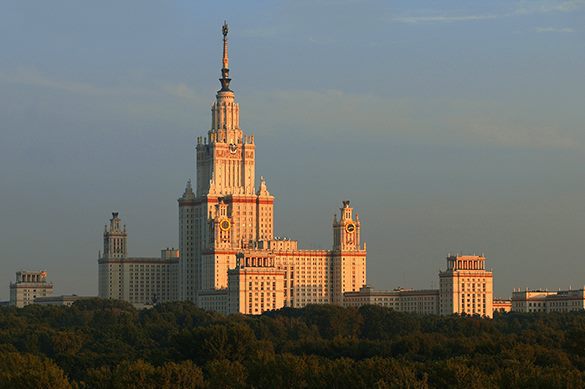
Secrets of Stalin's seven Moscow skyscrapers

Seven skyscrapers built in Moscow during Stalin’s times are the iconic part of the city’s skyline. Moscow historians believe that there was a reason why they were built. The project designers led by Stalin had intentions to demonstrate the entire world how strong and powerful the Soviet state was. They also say that Stalin was interested in astrology and decided to build the skyscrapers in accordance with astrological rules.
Rumor has it that Stalin planned to re-build Moscow to make it look like a Zodiac table. The metro loop line with 12 stations and nine skyscrapers representing planets were designed for these purposes. The Exhibition of Economic Achievements and the Ostankino TV Tower were to represent an asteroid belt. The metro loop line and the skyscrapers were built concurrently.
On January 13, 1947, when Moscow was celebrating its 800-year anniversary, Stalin signed a decree regarding the construction of skyscrapers in Moscow. The initial plan involved nine skyscrapers. The eighth one was planned to be built in Zaryadye, where the National Committee of Heavy Industry would be located. However, later it was decided to build hotel “Rossia” in that place.
The Soviet Palace was to take the central place among the skyscrapers. The Palace was to be built at the same spot where the Cathedral of Christ the Savior is located now and where Alekseevsky Convent used to be located. A legend says that the convent’s hegumeness cursed the place and promised that no building erected on that spot would last long.
The construction of the Soviet Palace was never completed. Later “Moscow” swimming pool was built on that spot and lasted 30 years. Today, the lot is occupied by the Cathedral of Christ the Savior.
The foundations of all nine skyscrapers were laid on the same day. Almost all of them were built along the Sadovoye Ring (Garden Ring Road), as if framing the historic downtown. In 1950, Stalin ordered to crown the buildings’ tops with stars. That is why people call the skyscrapers “seven pyramids” and “Moscow crowns.”
Only the most “deserving” people were given apartments in residential skyscrapers, mostly high-ranked military officers and Party officials. The higher was the rank, the higher was the apartment.
There were many rumors and legends about the “Moscow pyramids.” For instance, there was a rumor that the main building of the Moscow State University located on Vorobyevy Gory (Sparrow Hills) had extremely deep basements that virtually formed another building. Besides, they say there was a secret passage that connected the building with Stalin’s dacha.
Another rumor said that the building of the Moscow State University had a cryogen camera for cooling off soil. If the camera ever stopped working, the building would collapse.
The main building of the university was built by convicts. Many of them died right at the construction site since the working conditions were intolerable. Their dead bodies were brought to the basement and entombed into the walls.
Suicide rates among out-of-town students who live in the University skyscraper are very high since the energy of the building has a negative effect on them. Students jump out of the high floors of the building because of undivided love, failed exams, or fights with their friends.
There is a legend that a nuclear launching device is installed inside the top of the hotel “Ukraine.” They also say that each skyscraper has secret rooms and hallways where state security agents listen to conversations of ordinary mortals.
There is a rumor that the top floor of the building housing the Ministry of International Affairs is made of plywood. Every year, on December 31, laborers go to the top and paint the walls. They say that the construction costs were miscalculated and there was not enough money for the top floor, hence plywood. Another rumor says that Stalin saw the building missing the top floor and ordered that the construction to be completed immediately so that it did not look like New York skyscrapers.
Margarita Troitsina